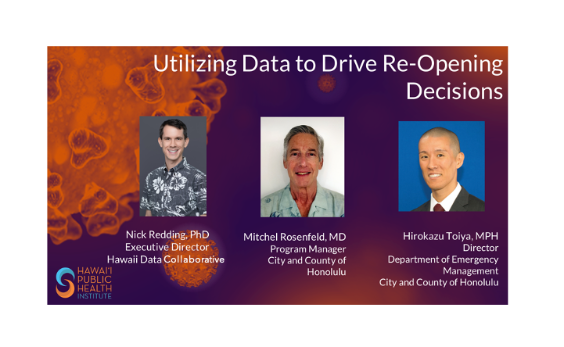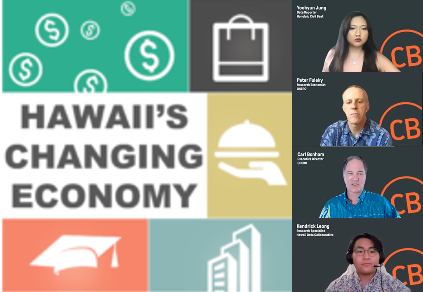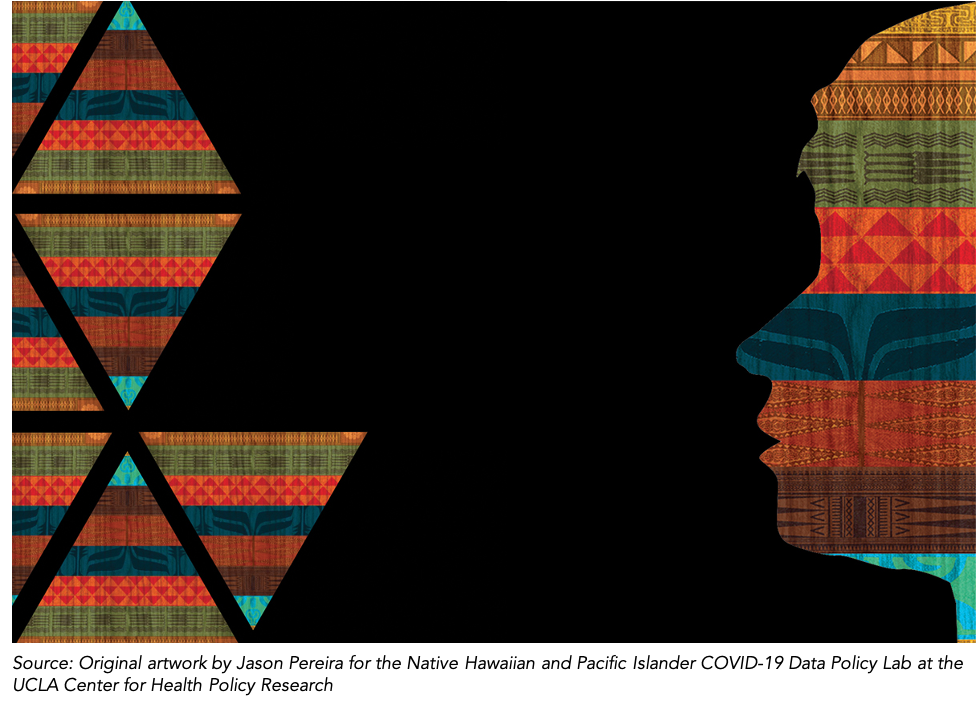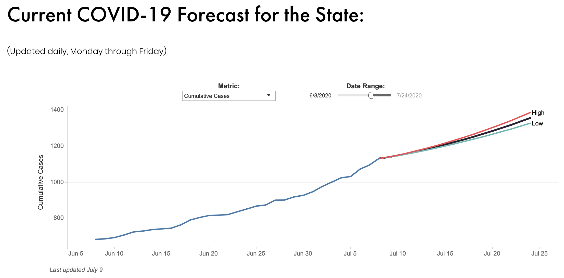News & Updates

TRUE Insight: Tableau Success Stories in Hawai‘i
Insight from data has made an impactful difference in Hawai‘i’s response to COVID.
On January 27, 2021, Deena Tearney, CEO of Pacific Point, moderated a panel that discussed how:
Successful response requires everyone to come together and rapidly innovate in times of crisis
Data, data visualizations, and data integration with other system increases decision making value
You can create and foster a data culture at your organization
Panelists included Jeremy Blaney of Tableau; Erin Hughey of Pacific Disaster Center; and Nick Redding of the Hawai‘i Data Collaborative.

The Hawai‘i Variable: COVID-19 Dashboards Workshop
On January 21, 2021, Civil Beat's data reporter, Yoohyun Jung moderated a panel of experts as they explored Hawai‘i's COVID-19 data dashboards during an in-depth workshop and discussion.
Panelists included:
Nick Redding, Hawai‘i Data Collaborative
Joshua Quint, Hawai‘i Department of Health, Disease Outbreak Control Division (DOCD)
Niea Gardner, Hawai‘i Emergency Management Agency (HIEMA)
Victoria Fan, University of Hawai‘i at Manoa and Hawai‘i Pandemic Applied Modeling Work Group (HiPAM)
Panelists demonstrated how to navigate Hawai‘i’s many COVID-19 data dashboards and figure out how to extract the most important, and interesting, information out of them.

Hawai‘i Economics and Economists In the Spotlight
In Hawaii Business Magazine’s December 2020 issue, Hawai‘i Data Collaborative’s Nick Redding and Kendrick Leong were featured in “Hawai‘i Economics and Economists in the Spotlight” by Sterling Higa, where they discuss how HDC first began as a project intended to produce an index of well-being for Hawai‘i, how the learnings from the project expanded HDC’s work to include unlocking the potential of publicly available data to support better decision-making, vulnerabilities in the state’s data culture that the COVID-19 pandemic brought to bear, and why we must be thoughtful with the economic indicators we focus on as it relates to how we define “economic recovery” (as discussed in a previous post).

HiPHI's COVID-19 Public Health Action Webinar: Utilizing Data to Drive Re-Opening Decisions
Hawaii Data Collaborative’s Executive Director, Nick Redding, joined the Hawaii Public Health Institute (HiPHI) and other panelists to discuss how COVID-19 data is informing the City and County of Honolulu’s re-opening strategy, tier system, and other related policy decisions. Some of the main points Nick highlighted were Hawaii Data Collaborative’s mission to elevate critical data to address Hawaii’s most pressing challenges; how the coronavirus pandemic amplified the urgency of that mission; and, some of the collaborative efforts that emerged to support the state’s response. Moderating the discussion was Stephanie Moir, from the HiPHI team; other panelists included Dr. Mitchel Rosenfeld, Program Manager with the City and County of Honolulu, and Hirokazu Toiya, Director of the City and County of Honolulu’s Department of Emergency Management.

The Hawaii Variable: A Data-Based Discussion About the Economy
Hawaii Data Collaborative’s Research Specialist, Kendrick Leong, joined Honolulu Civil Beat on a panel for a data-based discussion around the impacts of COVID-19 to Hawaii’s economy. Some of the main points Kendrick highlighted were the difficulty in finding county and sub-county data to aid decision making on neighbor islands; examining economic indicators in the context of COVID data; reiterating that economic recovery is value-laden; and, identifying groups that may be left out of federal aid spending.
Moderating the discussion was Yoohyun Jung, data reporter for Honolulu Civil Beat; other panelists included Dr. Carl Bonham, Executive Director of the University of Hawaii Economic Research Organization (UHERO), and Dr. Peter Fuleky, Research Economist at UHERO.

New Platform Provides Much-Needed Data on COVID-19 Impacts Among Native Hawaiians and Pacific Islanders
Last month, the UCLA Center for Health Policy Research unveiled its Native Hawaiian and Pacific Islander COVID-19 Data Policy Lab and corresponding NHPI COVID-19 Data Policy Lab Dashboard in an effort to address the dearth of information regarding the disease’s impact on these groups. Why is the launch of the Lab significant for NHPI researchers, and what can decision- and policy makers learn from the data the Lab makes available? We explore a few answers…

Metrics Maketh Man: The Economic Indicators We Track Define Us
The challenge of summarizing the entire economy through individual indicators is akin to perfectly defining the word “economy” itself. There is an ongoing academic dispute over whether composite indicators or indices are inherently good or bad. Critics object to the arbitrary nature of the weighting process, or the extent to which the performance of individual indicators contributes to movement in a single “score” or composite indicator. Regardless, indices are powerful in their ability to showcase in one score what might not be apparent from examining multiple individual indicators in isolation.
In this post, we take one step back from the debate and instead draw attention to why indicators are selected, rather than whether they should have been selected or combined at all. Our values as a society are revealed in the curation of economic indicators (whether for the Brookings dashboard or UHERO’s Economic Pulse) – we implicitly prioritize certain metrics by elevating them to a position within a dashboard or index. Let’s take a deeper look at a few specific indicators that illustrate this point.

Why We Are Working to Track Hawaii's COVID-19 Federal Funds Spending
Recently, our work to track the State’s progress in spending down federal funds awarded to the State in response to COVID-19 have been highlighted by the House Select Committee on COVID-19 Economic and Financial Preparedness and recent news accounts. The Hawaii Data Collaborative strives to promote a culture of data-informed decision making in Hawaii, by making data that is relevant to our most pressing challenges accessible, relevant, and meaningful.
Given the urgency of need as we continue to navigate post-COVID stresses on our families and communities, and the looming end-of-year timeline for spending down $1.25B in Coronavirus Relief Funds (CRF), we felt the need to work quickly to make sure information about our spending is available on a timely and insightful platform. Equally important are the partnerships that make this possible.

How Good Data Can Advance Health Equity
Research has consistently found Native Hawaiians and Pacific Islanders (NHPI) are at increased risk of a range of preexisting and underlying health inequities, which in turn places members of these communities at increased risk of infection and severe illness from COVID-19. During the current pandemic, the disproportionality of the disease’s impact distills the health inequities borne by our state’s Pacific Islander community: currently, 30 percent of confirmed COVID-19 cases are among non-Native Hawaiian Pacific Islanders, although they constitute only 4 percent of Hawaii’s population. Recent media coverage suggests, despite recognizing Pacific Islanders’ heightened health risks for the disease, Hawaii state health officials were unprepared to adequately address the needs of this institutionally underserved community during the pandemic.
How can Hawaii better serve the health needs of Pacific Islander communities, particularly as the state wrestles with the impacts of COVID-19? Good data can certainly be part of the solution. What might “good data” mean, in this context?

Instead of Relying on Stories, We All Need Access to Better COVID-19 Data
The potential of data lies not in its ability to reinforce stories — that leaves us reliant upon the storytellers. Instead, comprehensive and readily available data facilitate conversations that allow the broader community to see exactly what is happening and, if necessary, question assumptions about our current situation and what lies ahead. Over the last two weeks, it has become clear that state and county leadership do not have full access to the data and expertise needed to manage the disease. And neither does the public.

Checking Up on Hawaii’s Economic Health: Existing Metrics Tell Us Only Pieces of the Story
Although measures of GDP, unemployment, and retail and food sales all help assess the state of the local economy, there are a few caveats. One is data timeliness, or the schedule in which data is published and disseminated. GDP, reported quarterly, and retail and food sales, generally reported monthly, are often too slow to inform policy and planning decisions that need to be made and adjusted daily or weekly. However, Hawaii does do a good job in tracking unemployment claims weekly through the Hawaii Workforce Infonet, at least giving us a sense of the local job market. Another is data completeness, or how comprehensive a dataset is for answering the question at hand – in this case: how well is Hawaii’s economy recovering? Without one single identifiable metric for economic recovery, we need to look at other indicators beyond GDP, unemployment, and retail and food sales.

The Importance of Leading and Lagging Indicators for Ongoing Monitoring of COVID-19 in Hawaii
While it likely makes sense to most of us that these indicators measure different components of COVID-19 management – i.e. new cases, daily test rates, hospitalizations, etc. – it might be more difficult to understand how they all fit together, and why it is important to have a balance of indicators that represent the range of relevant factors for managing COVID-19 locally. One important frame to consider is distinguishing where data points fall along the continuum of leading to lagging indicators.

Making Meaningful Models Mainstream: We Are No Strangers to Informative Modeling
Sometimes events, especially unexpected and dramatic ones, can lead to a renewed perspective of what is occurring in our lives and how we view them. Hawaii’s recent brush with Hurricane Douglas was just such an event. We may not understand all that goes into a reliable weather model, but we have a gut sense of why it’s useful and valuable in saving life and property. For the average person, however, the same cannot yet be said of epidemiological models that study the spread of viruses and disease. While we experience the onset of tropical storms and hurricanes on a regular basis, we do not experience epidemics as frequently, and certainly not pandemics.

The Hawaii Variable: A Data-Based Discussion About COVID-19 in Hawaii
On July 30, 2020, Honolulu Civil Beat hosted an online event bringing together panelists for a data-based discussion around COVID-19 in Hawaii. Topics included review of basic data and epidemiology terminology, different types of indicators that inform understanding of outcomes and what lies ahead, gaps in critical data to better inform our response to the pandemic, and answers to questions from the audience.

Where Does Hawaii Stand in Terms of Publicly Available COVID-19 Data?
Earlier this week, a New York-based nonprofit, Resolve to Save Lives (RSL), headed by the former director of the Centers for Disease Control and Prevention (CDC), released a report outlining “15 essential indictors” that should be reflected in every State COVID-19 dashboard, including in what format the data should be reported and how the data should be stratified by age, sex, ethnicity and geography. Based on this framework, RSL inventoried each State in terms of the data that is currently publicly available. The results for Hawaii are not flattering. Out a possible 100%, Hawaii currently scores at 13%, making available (to RSL’s satisfaction) four out of the 15 recommended indicators:

HiPAM Launches New Daily COVID-19 Forecast Tool for Hawaii
The Hawaii Pandemic Applied Modeling (HiPAM) work group has launched a new public-facing tool that provides 14-day forecasts of new COVID-19 cases, hospitalizations and fatalities. The tool will be updated daily (Monday through Friday) based on the most current COVID data available in the state.

Data Equity: What Is It, and Why Does It Matter?
The term “data equity” captures a complex and multi-faceted set of ideas. It refers to the consideration, through an equity lens, of the ways in which data is collected, analyzed, interpreted, and distributed. It underscores marginalized communities’ unequal opportunities to access data and, at times, their harm from data’s misuse. It raises the issue of data sovereignty, and the democratization of data. And data equity pushes us to consider the ways that data can reinforce stereotypes, exacerbate problems like racial bias, or otherwise undermine social justice.

Hawaii Appleseed's Gavin Thornton Discusses $100 Million CARES Act Housing Support for Hawaii's Families
Gavin Thornton, Executive Director of the Hawaii Appleseed Center for Law and Economic Justice, discusses recent legislation passed that will provide $100 million of CARES Act funds to folks in need of rental and mortgage support, and why this assistance is necessary to shield the state from even greater costs in the future.

Fly on the Wall: A Glimpse into Developing a COVID-19 Modeling Tool for Hawaii
During a HiPAM convening, the group discussed how to respond to requests from local decision-makers for models and metric guidelines that would help determine when to lift local and domestic travel restrictions, as well as indicators of when restrictions may need to be re-imposed. The subsequent discussion demonstrated the complex array of factors that our state officials and senior executives must consider…

AUW's Lisa Kimura Discusses the Updated ALICE Report, and the Impact of COVID-19 on Hawaii's Struggling Families
Lisa Kimura, Vice President of Community Impact at Aloha United Way, discusses the updated ALICE® report, what it told us about Hawaii’s financially struggling families pre-COVID since the last report was done in 2018, how much Hawaii’s ALICE-and-below population will grow as a result of COVID-19, and the level of broad collaboration necessary to uplift families out of ALICE status.
